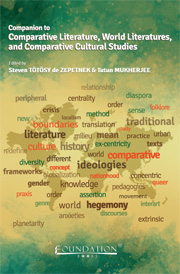Book contents
- Frontmatter
- Contents
- Introduction to the Companion to Comparative Literature, World Literatures, and Comparative Cultural Studies
- PART 1 Theories of Comparative Literature, World Literatures, and Comparative Cultural Studies
- PART 2 Comparative Literature in World Languages
- PART 3 Examples of New Work in Comparative Literature, World Literatures, and Comparative Cultural Studies
- African Literatures and Cultures and the Universal of Motherhood
- World literatures and the Case of Joyce, Rao, and Borges
- Abject Spaces and the Hinterland in Bolaño's Work
- The Motif of Fleeing in Gao's Work
- Arab Fiction and Migration in the Work of Haqqi and Salih
- Sexual Identity and Translation in Prime-Stevenson's Work
- The Notion of Life in the Work of Agamben
- Aesthetics, Opera, and Alterity in Herzog's Work
- An Intermedial Reading of Paley's Sita Sings the Blues
- Painting and Representation in Teaching Balzac
- PART 4 Multilingual Bibliography of Books in Comparative Literature, World Literatures, and Comparative Cultural Studies
- Index
The Notion of Life in the Work of Agamben
from PART 3 - Examples of New Work in Comparative Literature, World Literatures, and Comparative Cultural Studies
Published online by Cambridge University Press: 05 April 2014
- Frontmatter
- Contents
- Introduction to the Companion to Comparative Literature, World Literatures, and Comparative Cultural Studies
- PART 1 Theories of Comparative Literature, World Literatures, and Comparative Cultural Studies
- PART 2 Comparative Literature in World Languages
- PART 3 Examples of New Work in Comparative Literature, World Literatures, and Comparative Cultural Studies
- African Literatures and Cultures and the Universal of Motherhood
- World literatures and the Case of Joyce, Rao, and Borges
- Abject Spaces and the Hinterland in Bolaño's Work
- The Motif of Fleeing in Gao's Work
- Arab Fiction and Migration in the Work of Haqqi and Salih
- Sexual Identity and Translation in Prime-Stevenson's Work
- The Notion of Life in the Work of Agamben
- Aesthetics, Opera, and Alterity in Herzog's Work
- An Intermedial Reading of Paley's Sita Sings the Blues
- Painting and Representation in Teaching Balzac
- PART 4 Multilingual Bibliography of Books in Comparative Literature, World Literatures, and Comparative Cultural Studies
- Index
Summary
Abstract: In his article “The Notion of Life in the Work of Agamben” Carlo Salzani analyzes the notion of “nudity” Giorgio Agamben's understanding of Western culture. Beginning with a reading ofthe essay “Nudity,” in which Agamben proposes an archaeological investigation of the theological apparatus of the concept, Salzani analyzes the pivotal trope in Agamben's Homo Sacer project, “bare” or “naked life,” that is, the nudity of life in the grip of sovereign power. Nudity and the nudity of life are construed as a “limit-concept” in a double movement of simultaneous positing and negation or in a positing that grants at the same time the inappropriability of its object. Salzani highlights how much this “liminality” owes to a tradition that borders the aesthetics and ranges from Kant's “sublime” to Heidegger's Ereignis via Benjamin's “expressionless-ness.” In Agamben's thought this risks to resemble a “mystical intuition,” as he argues in his first book, The Man Without Content, about Kant's aesthetic judgment.
Introduction
The work of philosopher Giorgio Agamben has gained a central place in politico-philosophical debates since the publication of his 1995 book Homo Sacer. Agamben elaborates on and defines Western culture with a particular understanding and construction of the meaning of life based on the methodological approach of “archaeology” he borrows from Michel Foucault.
- Type
- Chapter
- Information
- Companion to Comparative Literature, World Literatures, and Comparative Cultural Studies , pp. 447 - 459Publisher: Foundation BooksPrint publication year: 2014

